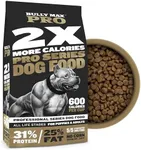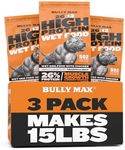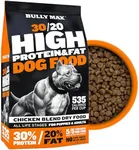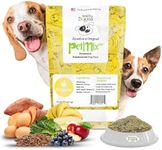Buying Guide for the Best Food For German Shepherd
Choosing the right food for your German Shepherd is crucial for their health, energy levels, and overall well-being. German Shepherds are large, active dogs with specific dietary needs. When selecting food, it's important to consider factors such as age, activity level, and any health concerns. Understanding the key specifications of dog food will help you make an informed decision that best suits your furry friend's needs.Protein ContentProtein is essential for muscle development and overall health. For German Shepherds, a high-protein diet is important due to their active nature and muscular build. Look for foods with a protein content of at least 22-26% for adult dogs and 25-30% for puppies. If your dog is highly active or a working dog, you might need to aim for the higher end of this range. Always ensure the protein comes from high-quality sources like chicken, beef, or fish.
Fat ContentFat provides energy and supports skin and coat health. German Shepherds benefit from a diet with moderate fat content, typically around 12-16%. Puppies and highly active dogs may require slightly higher fat levels for additional energy. Ensure the fat sources are healthy, such as fish oil or chicken fat, to promote a shiny coat and healthy skin.
CarbohydratesCarbohydrates are a source of energy and fiber. While not as crucial as protein and fat, they still play a role in a balanced diet. Look for foods with whole grains like brown rice or oats, or grain-free options with sweet potatoes or peas. Avoid foods with excessive fillers like corn or soy. The carbohydrate content should be balanced to provide energy without leading to weight gain.
Vitamins and MineralsVitamins and minerals are essential for overall health, supporting everything from bone development to immune function. Ensure the food contains a balanced mix of vitamins (A, B, C, D, E) and minerals (calcium, phosphorus, zinc). Puppies need higher levels of calcium and phosphorus for bone growth, while adults need a balanced mix to maintain health. Check the label for a comprehensive list of these nutrients.
Joint SupportGerman Shepherds are prone to joint issues like hip dysplasia. Foods with added joint support ingredients like glucosamine and chondroitin can help maintain joint health and mobility. These ingredients are particularly important for older dogs or those with a history of joint problems. Look for foods that specifically mention joint support on the label.
DigestibilityA food's digestibility affects how well your dog can absorb and utilize the nutrients. High-quality ingredients and the absence of fillers contribute to better digestibility. Foods with probiotics and prebiotics can also support a healthy digestive system. If your German Shepherd has a sensitive stomach, look for foods labeled as easily digestible or formulated for sensitive digestion.
AllergensSome German Shepherds may have food allergies or sensitivities. Common allergens include wheat, corn, soy, and certain proteins like chicken or beef. If your dog shows signs of allergies (itchy skin, digestive issues), consider a hypoallergenic or limited ingredient diet. These foods use novel proteins and carbohydrates to minimize the risk of allergic reactions.





















